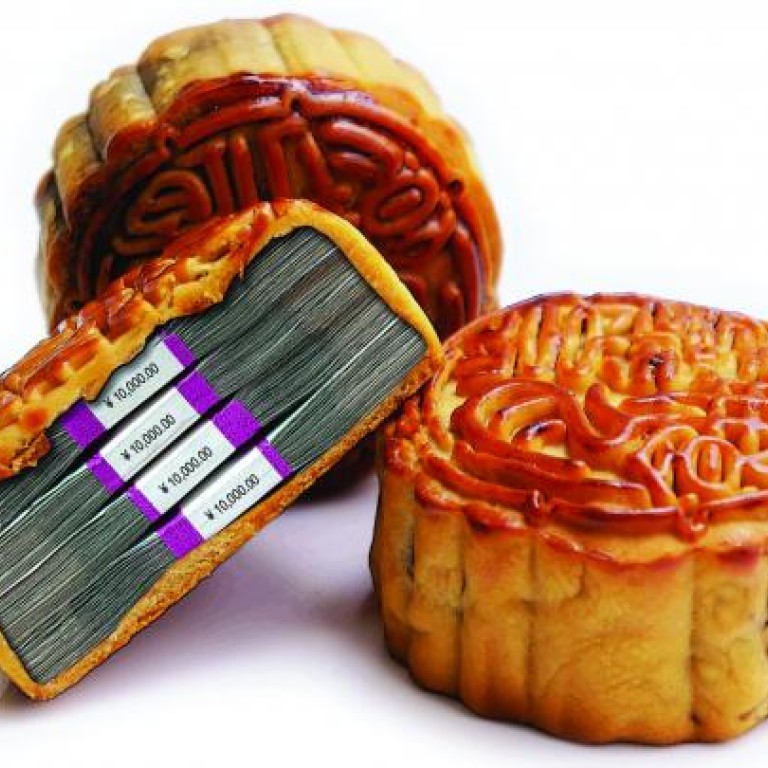
Dark side of the mooncake
The seasonal treat has become a bribe on the mainland, writes Shirley Lau
The mooncakes that many Hong Kong people munched on yesterday to celebrate the Mid-Autumn Festival are no luxury food. They are made of cheap ingredients such as red bean and lotus seed paste that hardly make a dent in a mooncake maker's profit.

In Nanjing, a premium box of four mooncakes costs 688 yuan. The "luxury autumn gift set" (price tag: 1,998 yuan) includes hairy crabs. China Merchants Bank in September sold 6,000 gold mooncakes at 16,000 yuan apiece. It quickly sold out of the item.
Do these pricey pasties taste better? "Not really," says Ouyang Kun, head of the Beijing office of the research group World Luxury Association.
"They are over-packaged, sometimes with 18-karat gold paper, and sometimes containing some luxury freebies. That's why they get marked up," he says.
As with a considerable number of over-the-top luxury products in the mainland, pricey mooncakes are often bought as gifts for business partners or government officials by "people who want to get something done", says Ouyang.
The government is clamping down, and this year's festival may mark the beginning of the end for the autumnal excesses.
As part of a wider effort to control wasteful state spending and official corruption, the State Council unveiled in July the Administrative Regulations on Governmental Affairs, which takes effect today.
The directive, which focuses on spending issues of "widespread public concern" such as official receptions and foreign trips made by government officials, contains a rule stating government departments should procure "economical products".
Economical, in this context, is defined as non-luxury goods.
This is a somewhat oblique corruption control. Government officials are unlikely to buy luxury goods with state money, as the wrongdoing would be too obvious.
However, Ouyang believes that people looking to bribe officials with, for example, expensive mooncakes will be put off by the new procurement rule. The linking of, and disapproval of, officials and luxury goods will discourage potential bribers, including those offering precious pastries.
It would not be the first time the government tried to control excessive mooncake gift-giving. In 2005, several government bureaus jointly introduced "administrative guidelines" on prices, quality, packaging and freebies to mooncake makers across the country.
A national standard for mooncake packaging was issued, stipulating that the maximum capacity of a mooncake box for 1kg of mooncake should be no more than 60cm in length, 30cm in width and 5cm in height. In addition, the cost of packaging should not exceed 25 per cent of the retail price.
These meticulous rules targeted pricey mooncakes with lavish extras that seemed designed less for eating and more for bribing.
According to mainland media reports, a few years ago in Zhengzhou, a box of mooncakes with a weight of 1kg cost 6,900 yuan because they were embellished with 56 jewels. But the crème de la crème was a mooncake set that appeared in Kunming in 2004, with a price of 310,000 yuan or - the least modest of all - a 100 sq ft apartment.
reported the 310,000 yuan mooncake that included a key to the flat. The press described it as a "bizarre" item that set a new standard of excess in the mooncake industry.
The mainland authorities' clampdown on such extravagance has pulled back on some of the more extreme mooncakes. Yet for the resourceful mooncake-makers and retailers, there is always a way to up the luxury quotient.
The aforementioned mooncakes-cum-hairy-crab gift set in Nanjing, for example, is now a widely used template. Pastry makers nowadays package their items into a hamper that includes all kinds of much-desired goods, without running afoul of the mooncake laws.
It's still a grey area. Some high-end hotels hide the luxury items that are as part of mooncake sets, according to Xinhua.
Customers, or hamper recipients, quietly and somewhat clandestinely pick up the luxury items from the hotel.
The luxury lure is obvious. Somewhat less apparent is the connection of the expensive mooncakes to an ancient family-oriented festival.
